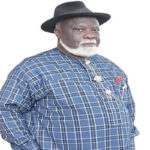
The Prison Rehabilitation Mission International has called for the provision of productive engagement for the inmates across the correctional centres in Nigeria.
The mission further described the annual budget allocation and subventions to correctional centres as wasteful, adding that productive engagement of the inmates could transform the prison into a self-funding system.
The Regional Director of PREMI, North and South America, Dr Silas Falokun, a staffer at the Texas Department of Criminal Justice in the United States, made the call at the “Rehabilitation, reformation, reintegration, and resettlement panacea for crime reduction in Nigeria” conference held in Lagos on Saturday.
Falokun said, “The Mandela mandate tells us the minimum standard by which a prisoner should be treated. A lot of the prisoners are willing to work but have nothing to do. Many of them are losing their health because they have nothing to do.
“Prison in Texas is a business. We have people who come in for various reasons. When they come in, they don’t just sit down and wait for the government to budget money to feed them. This is where idiosyncrasy is in Nigeria. How can you keep able-bodied men and women in prison? You keep them in prison, feed them, and they wake up in the morning and gang up to plan evil things. They sit all day, idling around. An idle hand is the devil’s workshop. These prisoners are crafty. They are intelligent.
“The correctional centres in Nigeria need help, and this is the reason why the government of today needs to yield to our plea to allow PREMI an inlet to correctional facilities in Nigeria. We want to bring our correctional centres to a stage where you have to be productive and not be a liability to the government. We want to organise classes for our inmates. We want to partner with the people to make necessary changes in the lives of prisoners so that prisoners won’t be left to suffer in prison.”
The Director General of PREMI, Bishop Kayode Williams, said the Nigerian prison system required a transition that would allow the inmates to reintegrate themselves into society without returning to crime.
He said, “I have been working on this since I returned from prison over 40 years ago. I have nothing that I am doing. Although I am a pastor, the prison issue is my lifetime commitment to humanity. I feel somebody should challenge that too, and the person who would challenge it must be an experienced person. It is not easy to sit in prison for 10 years. It is an experience of life.”





